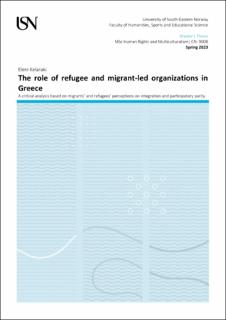| dc.description.abstract | In 2020, Greece adopted its third National Strategy for social integration of asylum seekers and international protection beneficiaries. Nevertheless, despite the salience that migration has received in the country due to the number of people who have arrived and the poor management of the situation by the Greek government particularly after the so-called “refugee-crisis” of 2015, the initiatives taken by the state have been reported to be scarce and stagnant. In this light, civil society organizations have substituted for the state to address urgencies connected to the presence of refugees and migrants in the country. The purpose of this thesis is to understand how solidarity associations, in the form of refugee and migrant-led organizations, can impact the comprehensive resettlement of refugees and migrants in Greece. For this purpose, I step away from state-constructed perceptions of integration and seek alternate approaches that are based on the participatory parity of refugees and migrants in society. Accordingly, the theoretical underpinnings of this study encompass Willem Schinkel’s critical approach to integration and Nancy Fraser’s theory on social justice, focusing primarily on the notion of participatory parity and recognition. Furthermore, this study is developed based on six semi-structured interviews conducted with leaders and members of refugee and migrant-led organizations in Athens, Greece. For the analysis of the collected data, Reflexive Thematic Analysis as introduced by Braun and Clarke (2022) was employed, and resulted in the development of four main themes; “It’s possible only for white people”, “A dog was helping us”, “If lights are necessary in Kifissia, they are also necessary in Omonia”, “You have to move in quicksand without sinking”. Underlying all four themes is the understanding that the subordination of refugees and migrants as social actors in Greece originates primarily from the negation of the Greek state to accept that refugees and migrants reside permanently in the country, and thus that the composition of Greek society is and will continue to change. In this light, I argue that the presence of refugee and migrant-led organizations is essential for the comprehensive resettlement and the enhancement of participatory parity of refugees and migrants in the country.
Key words: integration, refugee-led organizations, migrant-led organizations, social justice, participatory parity, recognition | |
